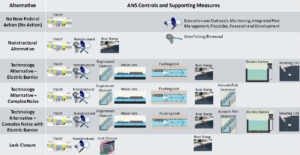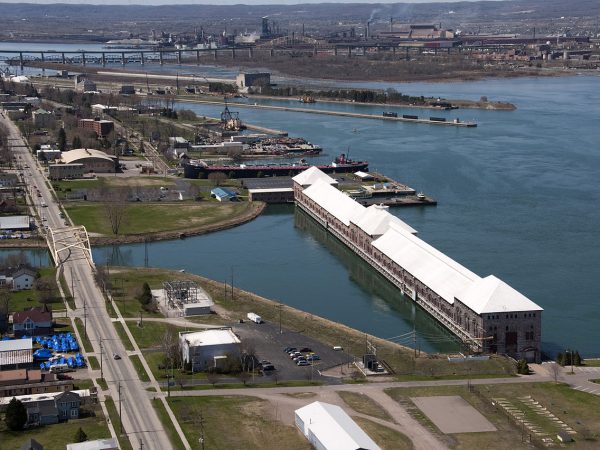In the fight against the Asian carp invasion of the Great Lakes, the U.S. Army Corps of Engineers has moved another step forward with one of their plans to deter that invasion.
Late last month, the Army Corps submitted its final approval of the project, known as the Chief’s Report, to Congress. It’s now up to Congress to authorize and fund the project.
The project in question explores what technology alternatives can be applied at the Brandon Road Lock and Dam near Joliet, Illinois—such as an engineered channel with an acoustic fish deterrent, air bubble curtain and electric barrier—to prevent Asian carp from getting into the Great Lakes.
It’s a plan that Illinois Gov. J.B. Pritzker is choosing to back, unlike either of his predecessors Gov. Bruce Rauner or Gov. Pat Quinn. Pritzker’s backing aligns Illinois with other states in the Great Lakes region regarding Asian carp strategy.
In an April letter to the Army Corps, Pritzker said Illinois “will continue as the non-federal sponsor of the project.”
Rauner’s administration steadfastly refused to support the plan known as the Brandon Road Lock and Dam project, because it involved physical modifications to the waterways that could have impeded or slowed barge traffic.
Illinois under Rauner, a Republican, and his Democratic predecessor, Quinn, has relied on an aggressive fish cull program designed to slow the advance of Asian carp, which was effective but never meant to be a permanent solution as juvenile carp may be able to breach the barriers unscathed. A physical barrier provides the best chance to stop the carp and other aquatic invasive species.
Michigan Sen. Debbie Stabenow said the Army Corps plan is a “critical step forward in our fight against Asian carp.”
“Most importantly, this report gives Congress what it needs to authorize funding for the project and finally advance a much-needed, long-term solution,” she said.
The Michigan congressional delegation is scheduled to travel to Illinois in early July for an Army Corps briefing and to work with Illinois colleagues on the project, according to Stabenow.
Cost remains an issue
Illinois’ approval of the Brandon Road plan is limited in scope to “preconstruction, engineering and design on the project,” Pritzker wrote in the letter to the Army Corps. That approval comes with significant caveats.
Pritzker reiterated previously expressed concerns that the cost of the plan had skyrocketed from an original estimate of $275 million to $778 million.
“I will not sign a Project Partnership Agreement without a cost control strategy,” Pritzker said. He also wants “additional cost sharing” with the other Great Lakes states.
He said that Illinois is not in a financial position to shoulder the costs of the project.
Pritzker asked that “we continue the conversation and include our Great Lakes neighbors, who also recognize the urgency of this issue and are critical strategic and financial partners, as we work to implement a solution that benefits everyone at the table.”
Michigan Gov. Gretchen Whitmer has signaled general support for the Brandon Road plan and financial support that could come from Michigan, based on former Gov. Rick Snyder’s offer to Illinois which was rejected by former Gov. Rauner.
Frustrated by the rebuke from Illinois, Snyder told Great Lakes Now before leaving office last December that he hoped Pritzker would be receptive to the financial outreach from Michigan and other Great Lakes states.
Michigan’s Department of Natural Resources also commented on the cost and design of the Brandon Road plan.
In a letter to the Army Corps, DNR Director Dan Eichinger said the cost of the project was “very concerning,” and he questioned some of the proposed engineering designs, wanting more participation from the states in the design process.
“Michigan would request that a solution-oriented workgroup be formed,” Eichinger wrote. It would include Illinois and other Great Lakes states.
“The (Army Corps) is always looking to reduce costs in any project we undertake,” said spokesperson Allen Marshall. “The costs related to the recommended plan are estimates and are based on largely conceptual designs and technologies.”
Both Illinois senators expressed support for Pritzker’s move.
“We agree with the Governor that the cost of this project must be shared by the Great Lakes region, and we will continue our work in the Senate to authorize this project under a cost-share agreement that will ensure Illinois isn’t stuck with the bill,” said Sen. Dick Durbin and Sen. Tammy Duckworth in a statement.
Durbin has a long history with Asian carp. He was instrumental in the early 2000s in securing federal funding for the electrical barriers that are still in place and are meant to deter the carp advance.
But he also was quick in 2014 to dismiss a high-profile, multi-billion dollar proposal championed by regional advocates to physically separate the Mississippi River from the Great Lakes as the ultimate solution. Durbin called the plan “risky” and feared it would fall victim to congressional inaction. The ambitious plan lacked support and died.
Pritzker, Durbin and Duckworth are Democrats.
Asian carp are “a national problem” that deserves national funding
Conservation groups were quick to support Illinois’ tentative approval of the Brandon Road plan and want the project to be seen as a national issue in order to secure full federal funding for it.
“This is a national problem,” said Josh Mogerman, spokesperson for the Natural Resources Defense Council (NRDC) in Chicago.
“It is going to require a national solution—that includes funding,” Mogerman said. “Pritzker’s position on that is understandable and hopefully not an issue moving forward.”
NRDC has historically advocated for physical changes to water infrastructure to stop carp, noting the dual benefits of keeping Asian carp out of the Great Lakes and the opportunity for overdue infrastructure improvement.
The National Wildlife Federation’s Ann Arbor office cited benefits of the Army Corps’ Brandon Road plan to Tennessee and Kentucky outside the Great Lakes region to bolster the case for full federal funding of the project.
“Asian carp aren’t just a problem for the Great Lakes or Illinois. They are impacting and threatening waters across the nation; they truly are a national issue requiring a national response,” National Wildlife Federation spokesperson Drew YoungeDyke told Great Lakes Now.
Congress could take up the Brandon Road plan later in 2019 and, if approved and funded, the work would be completed between 2025 and 2027.
A U.S. and Canadian group of mayors wants all parties to pick up the pace on the Brandon Road project.
At its annual meeting in June, the Great Lakes & St Lawrence Cities Initiative called for all parties to act “expeditiously” and “consider out-of-the-box approaches” to advance the Brandon Road project.
Great Lakes governors and Canadian premiers announced recently at a conference in Milwaukee that they would have a leadership group in Illinois in mid-July to assess the Army Corps plan.
Michigan Gov. Gretchen Whitmer highlighted the financial commitment Michigan has already pledged to stop the carp advance.
“We’ve got to make sure we’ve got a barrier that’s impenetrable,” Whitmer said.





